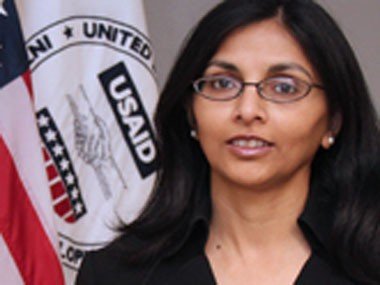America
Resurgent India driving Asian growth story: US official
By
Arun Kumar
With India-US relations stronger than ever since the election of Prime
Minister Narendra Modi, the two countries have become drivers of growth
across the region and around the world, according to a senior US
official
"If there is one overarching positive trend that is
driving the energy and optimism across South Asia, it is the resurgence
of India," Nisha Desai Biswal, Assistant Secretary of State for South
and Central Asian Affairs, told a Congressional panel Tuesday.
This
was "evidenced by their vibrant election last year, which was the
largest such democratic exercise in history, she said testifying on "The
US Rebalance in South Asia: Foreign Aid and Development Priorities."
Asserting
that less than one year after Modi's election as Prime Minister US
"relations with India are stronger than ever," Biswal said President
Barack Obama's historic Republic Day visit was critical beyond its
symbolism.
She listed "important outcomes in four key areas -
advancing our strategic partnership, deepening our security cooperation,
revitalizing the economic partnership, and advancing critical clean
energy and environmental goals.
"As we have energised bilateral
relations with the new Indian government, there can be no doubt about
the strength of our joint strategic vision," Biswal said.
"Our
two countries are indispensable partners in promoting peace, prosperity,
and stability across the Indo-Pacific region," she said.
"We are
drivers of growth across the region and around the world. And we are
net providers of security, together ensuring freedom of navigation and
safeguarding the maritime domain," Biswal said.
The US, she said,
supported "India's economic rise, including its domestic economic
transformation" because for "India to be a strong partner in the region
and around the world, it must be strong at home."
So Obama and
Modi had agreed to "elevate our commercial and economic partnership as
part of the Strategic and Commercial Dialogue to advance our shared
prosperity."
Biswal said the US was optimistic that the many
challenges to creating the investment climate and innovation economy
that will power India's growth in the 21st century can be overcome.
Modi
and Obama, she noted had agreed that the two "countries will continue
to work together on our ambitious energy and environment goals by
renewing and expanding a five-year MOU on Energy Security, Clean Energy,
and Climate Change."
They also committed to work together
towards a successful climate agreement in Paris and pledged to work
toward the goal of phasing down hydrofluorocarbons under the Montreal
Protocol, Biswal said.
US assistance programmes in India are a
model for making "a little go a long way," she said noting "by
leveraging the private sector and Indian resources, we are getting
sizable outcomes out of small inputs."
"Our programmes connect to
India's public and private sectors to jointly achieve development gains
in a cost-effective manner in India and in third countries, where
India's achievements stand to jump-start development results," Biswal
said.
"This model of assistance - which positions India as a
development lab with global reach - combines US and Indian innovation
and best practices, which can be road-tested and refined in India and
then exported to developing countries in Africa and Asia," she said.
In
keeping with both US and Indian priorities, the USAID programme focuses
on four key areas: health, energy and environment, education, and food
security, Biswal said.
"With nearly 2 billion people, a growing
middle class, an entrepreneurial culture, and a resurgent Indian
economy, South Asia will play an increasingly important role in the
Asian growth story," she said.
(Arun Kumar can be contacted at [email protected])

























